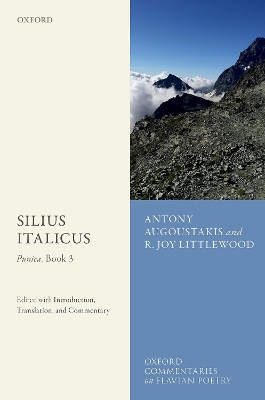Oxford Commentaries on Flavian Poetry
1 total work
Hannibal's crossing of the Alps represents a momentous event in the beginning of the Second Punic War (218-202 BCE). The third book of Silius Italicus' Punica reimagines this courageous feat, retracing the journey of Hannibal and his army from the temple of Hercules/Melqart in Gades, across the Pyrenees, the Rhone, and the Alpine peaks into northern Italy. Significant stages in the journey are marked by prophecies: the gods reveal to Hannibal in a dream his
future destruction of Italy through a dream with a giant snake; Jupiter unveils to his daughter Venus the future of the Roman empire through the Flavians and Domitian himself; the oracle of Hammon in the African desert prophesies the Roman defeat at Cannae.
The Flavian poet builds his narrative around several key episodes that programmatically set the tone for the whole poem: separation from family, a futuristic distinction between African and Iberian troops in the catalogue, the transgressive nature of Hannibal's struggle with nature and the divine.
The commentary explores each scene in the context of the poetic, philosophical, and historiographic background, with reference also to material culture. The philological and stylistic exegeses aim to reveal the linguistic complexities which colour this fascinating Flavian reconstruction of the topos of 'the epic hero's journey'. The Latin text is presented alongside an English translation and supplemented with maps and images to support understanding the broad historical context of
Silius' poem.
future destruction of Italy through a dream with a giant snake; Jupiter unveils to his daughter Venus the future of the Roman empire through the Flavians and Domitian himself; the oracle of Hammon in the African desert prophesies the Roman defeat at Cannae.
The Flavian poet builds his narrative around several key episodes that programmatically set the tone for the whole poem: separation from family, a futuristic distinction between African and Iberian troops in the catalogue, the transgressive nature of Hannibal's struggle with nature and the divine.
The commentary explores each scene in the context of the poetic, philosophical, and historiographic background, with reference also to material culture. The philological and stylistic exegeses aim to reveal the linguistic complexities which colour this fascinating Flavian reconstruction of the topos of 'the epic hero's journey'. The Latin text is presented alongside an English translation and supplemented with maps and images to support understanding the broad historical context of
Silius' poem.
